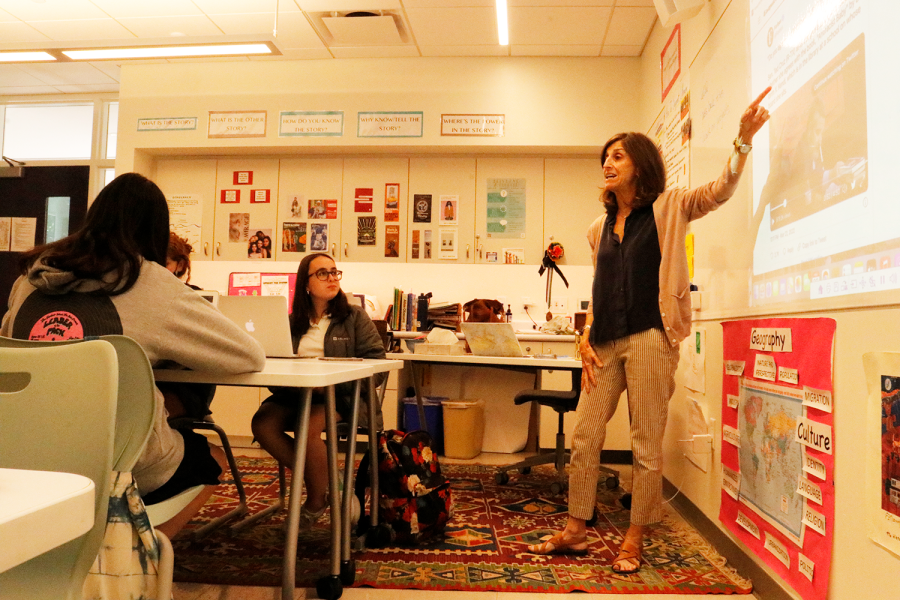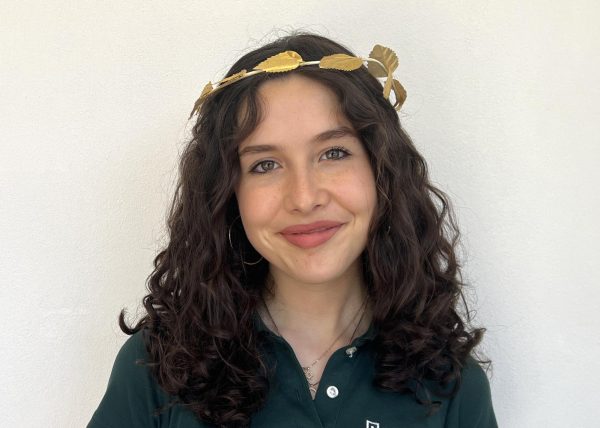‘There’s always going to be something missing’: Archer’s community practice unpacks difficult knowledge
Photo credit: Lucy Williams
History teacher Beth Gold teaches her ninth grade students about Ibram X Kendi’s children’s book, “Antiracist Baby.” The class dives into a multitude of difficult topics throughout the year through units on race, religion, gender, government and gender and sexuality. “Difficult knowledge” often comes up in these units, and the curriculum has changed over the years due to new research or social movements.
April 26, 2022
From the 6 million Jewish people who died in the Holocaust, to Russia’s current invasion of Ukraine, horrific events have rocked the world’s history. Lately, teachers have wrestled with their duty in these situations: informing the youth. Archer history teacher Elana Goldbaum conducted a community practice to research how to teach students about difficult content, upsetting knowledge or emotionally-triggering events. The study was part of her dissertation to earn her doctorate in education at Texas A&M University. From August to February, she led four meetings with the English and history departments to discuss these topics in research and in classrooms. Goldbaum met more frequently with a focus group to check in with the research and assess classroom observations.
The two departments surveyed Archer students in grades six through 12 in February. History teacher Bethany Neubauer said the surveys aimed to assess the efficiency of Archer’s current tactics for teaching difficult knowledge and see if students felt supported emotionally.
“The goal is to come up with a list of approaches we know are working well. We did our own internal research by asking our students, ‘When we did this activity or this project, how did it work?'” Neubauer said. “Ms. Goldbaum has also been supplying us with research articles to read about what other researchers are finding.”
Goldbaum said “difficult” knowledge includes major traumatizing events like genocide, war and social hatred. These topics range from the concept of racism toward people of color to the 9/11 terrorist attack in 2001. Goldbaum said this relevant history is inescapable, but can be uncomfortable when trying to balance the facts with emotions.
“The reason they’re considered difficult is they can challenge preconceived beliefs,” Goldbaum said. “Difficult knowledge can make somebody feel like they have an ethical obligation they’re not fulfilling, so there can be a wave of shame and guilt. It can also result in other emotional reactions like wanting to like distance yourself from it or skip over it entirely because it’s too painful.”
Goldbaum first came to Archer before the presidential election in 2016 and said she started this project due to Archer students’ increasing distress when talking about problematic histories. After conversations with other history and English teachers over the past few years, Goldbaum said she came to the consensus it was worth investigating further.
“I had come from a public coed school, and teaching about difficult things like genocide, racism, heterosexism, sexism and oppressive forces in history was a major part of my class,” Goldbaum said. “Archer was probably the first time where I had observed more discomfort with those kinds of topics, either from students or from parents. There was always concern about, ‘Is this going to be hard? Is this going to upset me? Am I going to upset other people?'”
Goldbaum said skipping over the knowledge of these conflicts, acts of violence and disagreements disregards the United States’ history of oppressing marginalized communities. Her research includes solutions to teaching this history while still giving all people in the narrative a voice.
“There’s never going to be a time, at least in my lifetime, when we don’t have to teach difficult knowledge,” Goldbaum said. “You have to balance difficult knowledge with joy, celebration and art, looking at the beauty of people who have been historically marginalized so they don’t sit in this damaging box of oppression all the time.”
Goldbaum said teaching these histories is nuanced in a classroom with multiple identities. At a diverse school like Archer, the range of identities in the room could react differently to historic events that intersect with a range of identity groups.
“There is no exact right way to do it, but there are practices backed up by decades of research to show this is going to yield a more positive result in a classroom,” Goldbaum said. “We are not a homogenous community. We have students of different ethnicities, of different races, of different religions, of different gender identities, so that all has to be taken into account by the teacher.”
Goldbaum investigated the data from the student surveys and collaborated with Archer teachers to review the commonalities and differences across grade levels. Using this data, she developed an 11-page document with research-based practices and resources to share with Archer teachers. In the future, she hopes to input more of these practices into classrooms.
“We looked at the resource packet and asked, ‘What practices are we doing? What practices do we need to incorporate?” Goldbaum said. “It was so cool to see the things students say are helpful. One of the nerdiest things for me was the suggestions some students gave matched up with the research, and we could verify these things work.”
Goldbaum referenced difficult knowledge curricula in schools of high conflict societies, including Northern Ireland, South Africa, Rwanda and Germany. She said she found in seeking to emotionally support students, teachers sugarcoated history and offered a binary view of the “good” and “bad” people. She said a solution to this was “both-and” thinking or embracing nuance as a society.
“Teaching about the Holocaust in Germany, they designed the curriculum to appeal to the generation after World War II. But now, it’s a different generation, and Germany is more culturally and ethnically diverse,” Goldbaum said. “For example, there’s a higher population of people from Turkey in Germany. They don’t have a direct responsibility to the Holocaust the way Germans might, so they have to redesign that curriculum to meet the needs of a new generation.”
English Department Chair Brian Wogensen participated in this community practice and was also a member of the focus group. He said the goal of the study was for teachers to recognize their mistakes and work to fix them. The main takeaway for teachers is that teaching difficult knowledge is a continuous challenge because societies are ever-changing, so classrooms must adapt alongside the world.
“Where have we struggled, and where have we made mistakes? Part of the community practice is to recognize the best ways to correct those mistakes and find new things we can do,” Wogensen said. “One of the things that have been instilled in everyone is this has to be continuously revisited and explored.”










Vivianne Arnold • May 9, 2022 at 11:56 am
Great article! I know a lot of my friends debate whether Archer is actually diverse, or just uses to label to make people feel better. It’s neat to see how our teachers think about it.